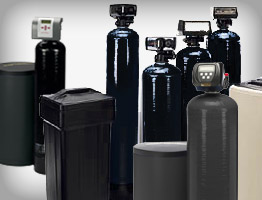Effective Water Softener Installation & Repair in Mooresville, NC
Lake Norman Plumbing Company specializes in effective water softener repair and installation services. Our team ensures that your water softening systems are installed properly, providing your home with soft water that prevents mineral buildup and extends the life of your plumbing. By removing calcium carbonate from your water, our systems protect your pipes and appliances from the damaging effects of mineral deposits.
Whether you need a new softener installation or maintenance on an existing unit, we have the expertise to handle it all, including the brine tank setup and system adjustments to maintain optimal performance. Contact us today for soft water.

What Is a Water Softener?
A water softener is a device that removes minerals such as calcium and magnesium from hard water. Hard water can cause a variety of issues, including scale buildup in pipes and appliances, soap scum on fixtures, and dry skin and hair. The water softener works by exchanging these hardness minerals with sodium or potassium ions, effectively softening the water.
A water softener removes minerals like calcium and magnesium from hard water through a process called ion exchange. Hard water flows into a tank containing resin beads coated with sodium or potassium ions. These beads attract and bind the hardness minerals, releasing sodium or potassium ions into the water. This results in softened water, which is then supplied to your home.
Water Softener vs Water Filter
A water filter and a water softener serve different but complementary purposes in improving water quality. A water filter removes contaminants such as chlorine, bacteria, sediment, and other impurities, enhancing the taste and safety of drinking water. It works through various methods, such as activated carbon, reverse osmosis, or UV light, to trap or neutralize harmful substances.
On the other hand, a water softener specifically targets hardness minerals like calcium and magnesium, which cause scale buildup in pipes and appliances. An ion exchange process replaces these minerals with sodium or potassium ions, preventing scale formation and improving soap efficiency.
Install a Water Softener to Your Water Filtration System
Using a water filter and a water softener together provides comprehensive water treatment for your home. While the water filter ensures that your drinking water is free from contaminants, improving its taste and safety, the water softener addresses hard water issues, protecting your plumbing and appliances from mineral buildup.
Combining these systems ensures that all the water entering your home is clean and soft, offering better-tasting drinking water and extended appliance life. This dual approach provides a complete solution to water quality issues, enhancing overall household water usage.
Signs You Need a Water Softener Replacement
Over time, water softeners can lose their efficiency and effectiveness, leading to a range of issues in your home. Here are some common signs that indicate it might be time to replace your water softener:
- Hard Water Symptoms Return: If you notice scale buildup on faucets, soap scum in sinks and bathtubs, or a decrease in soap lather, it could mean your water softener is no longer functioning properly.
- Decreased Water Pressure: Mineral buildup in your pipes caused by ineffective water softening can lead to reduced water pressure throughout your home.
- Old Age: Most water softeners have 10-15 years of life. If your system is within this age range or older, it may be time for a replacement to ensure optimal performance.
- Frequent Repairs: If you frequently repair your water softener, replacing it with a new, more reliable unit might be more cost-effective.
- Changes in Water Quality: If you notice a change in the taste, smell, or appearance of your water, it could indicate that your water softener is not working as it should.
- High Salt Usage: If your system consumes more salt than usual, it may struggle to soften the water effectively, signaling that it's time for a new softener.
- Inconsistent Soft Water: If you experience periods where the water feels soft and other times when it feels hard, this inconsistency can be a sign of a failing water softener.
If you observe any of these signs, it's a good idea to consult a professional to evaluate your water softener and discuss replacement options to maintain the quality and efficiency of your home's water system.
Water Softener FAQs
Why Might I Need a Water Softener?
How Do I Know if I Have Hard Water?
What Are the Benefits of a Water Softener?
How Long Do Water Softeners Last?
How Often Should a Water Softener Be Serviced?
What Size Water Softener Do I Need?
What Is the Life Expectancy of a Water Softener?
Can I Clean My Own Water Softener?
However, it is highly recommended that you schedule a professional water softener system service with Lake Norman Plumbing Co. for a thorough inspection and cleaning.
How Do I Know When My Water Softener Needs to Be Cleaned?
Additionally, if your water softener hasn't been serviced in over a year, contact Lake Norman Plumbing Co. for a professional water softener maintenance service to prevent further issues.
Who Services Water Softeners?
Contact Lake Norman Plumbing Co. for reliable and professional service to ensure your water softener continues to provide high-quality, softened water for years to come.
Your Local Plumbers: Contact Lake Norman Plumbing Company
If you're worried about hard water in your water supply, add a water softener to your property! Our test kit can determine the type of water softening you need. Furthermore, we can tackle any issue with your plumbing system, including low water pressure issues. For comprehensive plumbing services, contact Lake Norman Plumbing Company.



 (704) 663-8820
(704) 663-8820 Leave A Review
Leave A Review








